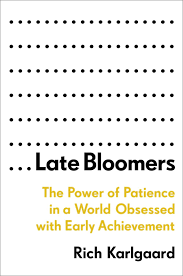Joanne, 54, is a late bloomer. Her teenage years were unstable and unhappy. Her mother suffered from multiple sclerosis. Her father earned enough money to support the household, but he was too emotionally frozen to deal with his wife’s illness. Joanne and her father barely spoke to each other.
In school, Joanne blended into the background. She earned above-average grades but hardly good enough to earn high honors and distinction. A teacher recalls Joanne as bright but unexceptional. An introvert, Joanne passed through high school with few remembering her. She was rejected by the elite college of her dreams. At her fallback college, she kept up her practice of acceptable mediocrity. She was good enough to get by but little more.
Typical of many reasonably bright, unfocused college grads, Joanne entertained thoughts of grad school, perhaps in teaching English. But her first swing at full-time employment was more humbling: a low-level administrative job. For a while, she was a secretary at the local chamber of commerce office.
Bored, Joanne impulsively married a man from a different country. The marriage didn’t survive two years, despite having a child. At nearly 30, Joanne saw herself at a dead end, with no job and a dependent child. Perhaps not surprisingly, she began to spiral down. She was diagnosed with clinical depression, which prevented her from working much and earning money. She hit an economic bottom: “I was as poor as possible without being homeless,” she says. Making matters worse, her ex-husband began stalking her and her daughter, forcing her to seek a restraining order.
Legendary quarterback Tom Brady didn’t merit even a humble two or one ranking in high school. His ranking was NR — “no ranking.”
But Joanne had something going for her, a unique talent that no one else knew she possessed. Her formal education hadn’t unearthed it. No teacher had seen it. But it was there all along, waiting to be discovered. In the months after Joanne hit economic bottom and went on welfare to feed her daughter, she let her imagination drift to her childhood fantasies. It was an act of escapism that oddly enough took her closer to her gift. Only when Joanne let go and let her imagination run loose did her talent begin to surface in spectacular fashion.
Ken, 68, is another late bloomer. The youngest of three, his family nickname, Poco, is Spanish for “little.” Ken’s oldest brother — a star athlete, teacher’s pet, popular, handsome, articulate — won a Rockefeller Scholarship and got into Stanford. Ken, however, was no early bloomer, and his school years just slipped by. He began to believe that Poco meant “of little significance.”

After graduating from high school in California, Ken went to the local junior college and promptly flunked out. Then he applied himself, retook the courses he’d failed, graduated, and transferred to Humboldt State, where he majored in forestry. But actual jobs in forestry, he discovered, were more about pushing paper than adventurous hikes in the woods. He became disillusioned.
Ken then went into business with his father, a financial adviser of national renown. But the two didn’t get along. “My father,” he says, “suffered from a condition that today would be recognized as Asperger’s Syndrome,” a form of near-autism. “He had no ability to fathom what others were feeling. He could say the cruelest things, yet he wasn’t cruel.”
After nine months, Ken left his father’s business and hung out his own shingle as a financial adviser. But with few clients, most of whom he would lose after a few years, he spent long hours with nothing to do. To bring in money, he took construction jobs. He even played slide guitar in a bar. But mostly he read. “Books about management and business — and maybe 30 trade magazines a month for years. During this decade, I developed a theory about valuing companies that was a bit unconventional.”
With an Asperger’s syndrome father, Ken had no role model for leadership. Throughout his 20s, Ken’s financial advisory service struggled. But his theories landed him a few minor deals in venture capital. One led him to serve as a temp CEO. He felt his ambition stirring and worked it hard.
“There were about 30 employees. I’d never managed anyone. Now I had to. And I did okay — much, much better than expected. Do you know what I learned? I learned the most important part of leadership is showing up. I made it a point to be the first there every day and the last to leave. I wandered around endlessly talking to employees, focusing on every single one and what they thought. The effect amazed me. And them. That I cared made them care. Suddenly I felt what it was like to lead.”
Ken was 30 years old before he began to touch his potential.
Have you identified these two late bloomers? Here’s a hint: Joanne and Ken are both self-made billionaires who regularly appear on the Forbes list of the wealthiest people in the world. Joanne Kathleen (J.K.) Rowling is author of the Harry Potter series. Ken Fisher is the founder of Fisher Investments, which manages $100 billion in stocks and bonds for more than 50,000 clients worldwide.
Successful late bloomers like Rowling and Fisher, with their bashful young years, slow starts, and unhurried journeys, have appealing stories. But their stories are also curiously out of step with today’s hip social media culture. Rowling is in her 50s, and Fisher in his 60s.
I believe that late bloomers do not get their due recognition, and that both people and society suffer for it. I believe the story of those who bloom later in life is more necessary and urgent than ever.
At the opposite end of the success spectrum is the early bloomer, the fast starter. Five-foot-one-inch Riley Weston was spectacular; at age 19, she landed a $300,000 contract with Touchstone, a division of Walt Disney, to write scripts for the television show Felicity — the coming-of-age story of a UCLA freshman. Weston’s fast start in major league television landed her on Entertainment Weekly’s list of Hollywood’s most creative people.
There was only one problem. Riley Weston was not 19. She was 32, and her real identity was Kimberlee Kramer from Poughkeepsie, New York. “People wouldn’t accept me if they knew I was 32,” she said. She was probably right.
Never before, it seems, has precocity been such an advantage as it is now. Every year Forbes celebrates young superachievers in a “30 Under 30” issue, featuring today’s disruptors and tomorrow’s brightest stars. Nor is Forbes the only publication to celebrate the precocious among us. The New Yorker’s “20 Under 40,” Fortune’s “40 Under 40,” Inc.’s “35 Under 35,” and Time’s “30 Under 30” issues likewise tip to those who succeed spectacularly at an early age.

Please don’t misunderstand me. There is nothing wrong with applauding or encouraging early success. Achievements of all types deserve recognition and admiration. But excessively promoting the primacy of early measurable achievement — grades, test scores, glamour job, money, celebrity — conceals a dark flipside: If we or our kids don’t knock our SATs out of the park, gain admittance to a top-ten university, reinvent an industry, or land our first job at a cool company that’s changing the world, we’ve somehow failed and are destined to be also-rans for the rest of our lives.
This message, I believe, creates a trickle-down societal madness for early achievement. This has led to very costly mistakes on the part of educators and parents in how we evaluate children, inflict pressure on them, and place senseless emotional psychological burdens on families.
A recent sports story makes the point. In the 2018 Super Bowl, neither the Philadelphia Eagles nor the New England Patriots had many five-star recruits in their starting lineups. Translation: Only 6 of the 44 starters had been top-rated prospects in high school.
Now look at the quarterbacks. New England’s Tom Brady didn’t merit even a humble 2 or 1 ranking in high school. His ranking was NR — “no ranking.” The victorious Eagles quarterback, Nick Foles, winner of the 2018 Super Bowl’s most valuable player award, had a 3 ranking in high school. But for most of the season, Foles was actually the Eagles’ backup. He got to play only after starting quarterback Carson Wentz hurt his knee toward the end of the season. Wentz, like Brady, had an NR ranking in high school. No surprise: As a high school junior, Wentz wasn’t primarily a quarterback. His school’s football program listed him as a wide receiver.
With his lowly NR rank from high school, no major college football program had recruited Wentz. He went to North Dakota State, a small-college powerhouse. But while he was there, he grew to 6 foot 5 and 230 pounds. Wentz literally blossomed in college, which is late by football standards. Now let’s ask ourselves. How many of us are potential Carson Wentzes? How many of us were tagged with “no ranking” in high school, or dismissed early in our careers, or are dismissed even now? What gifts and passions might we possess that haven’t yet been discovered but that could give us wings to fly?
“There are no second acts in American lives,” wrongly observed the Great Gatsby author F. Scott Fitzgerald.
Google once believed in early bloomer supremacy, and it’s easy to see why. The company was started by two Stanford graduate students who had scored blazing math SATs. For the first few years, Google hired young computer scientists and math whizzes in the image of its brilliant founders. Then Google discovered its workforce was lopsided; it had too much analytical IQ and not enough artistic sensibility and common sense. This disparity led to costly mistakes in the Google homepage design. More recently Google has discovered that having high SAT scores and an elite college degree are insufficient predictors of an employee’s career success at the company.
“There are no second acts in American lives,” wrongly observed the Great Gatsby author F. Scott Fitzgerald. But Fitzgerald was an early-blooming snob: He attended Princeton and was already a famous literary success in his mid-20s. But that was his peak. By his 30s, Fitzgerald was spiraling downward. He must have met all kinds of late bloomers and second acts who were on their way up. He died a bitter man at 44, the same age that Raymond Chandler began to write detective stories. Chandler was 51 in 1939, the year his first book, The Big Sleep, was published.
Today early bloomers are in the headlines, but in fact, many of them are suffering terribly. The pressure to achieve early success led to three student suicides in the 2014–15 school year at Gunn High School, a public school in Palo Alto, California, three miles from the elite Stanford University campus. All were good students striving for early achievement. By March in the same school year, 42 Gunn students had been hospitalized or treated for suicidal thoughts.
Theirs is hardly an isolated story. Rates of depression and anxiety among young people in the United States have been increasing for the last 50 years. Today five to eight times as many high school and college students meet the diagnostic criteria for major depression and/or anxiety disorder as in the 1960s. The Centers for Disease Control recently found that among high school students in the United States, “16 percent reported seriously considering suicide, 13 percent reported creating a plan for suicide, and 8 percent reported trying to take their own life in the 12 months preceding the survey.” These numbers are grim. As with many cultural trends in America, we seem to have exported our anxiety as well. A 2014 survey released by the World Health Organization found depression to be the number one cause of illness and disability in adolescents worldwide.
These rising rates of mental illness in young adults are alarming. Some part of the increase is likely due to better diagnosis, increased access to care, and greater willingness to seek help. But most experts agree that a significant portion of the trend is due to our changing cultural expectations. And these expectations — based on intensified measurement and evaluation — seem to have made even the most successful students more fragile than ever before. This is an awful trend, since it diminishes the very things that make us human — our experiences, our resilience, and our lifelong capacity to grow.
The fact is, many of us are late bloomers (or potential ones) of some kind. Given the intense pressure on us to succeed — in school, in sports, in our early careers — we panic. But neuroscience makes it clear that we should go easier on ourselves. The median age for the full maturation of executive functioning is around 25. I was closer to 27 or 28 before I became conscious that I could think rationally, plan ahead, and comport myself like an adult. This was a full decade after I took the SAT (to middling results) and a half-decade after I graduated from a good university (with mediocre grades). I shudder to think what would have happened if those two failures had been my ultimate sorting criteria.
So what exactly does it mean to be a late bloomer? Simply put, a late bloomer is a person who fulfils their potential later than expected; they often have talents that aren’t visible to others initially. The key word here is expected. And they fulfill their potential frequently in novel and unexpected ways, surprising even those closest to them. They are not attempting to satisfy, with gritted teeth, the expectations of their parents or society, a false path that leads to burnout and brittleness, or even to depression and illness. As Oprah Winfrey says, “Everyone has a supreme destiny.” Late bloomers are those who find their supreme destiny on their own schedule, in their own way.
Blooming has no deadline. Our future story is written in pencil, not carved in stone. It can be changed. There is no fixed chronology to self-determination, no age limit for breakthroughs. What we accomplish in the marathon of life depends on our persistence, our patience, and an ability to see ourselves as we really are.
When we take the longer road to success, we develop a clearer sense of where we are, where we want to go, and what new pathways are open to us. Along our different journeys, we find meaning and confidence in our adaptive skills. We try new things. We discover old truths. We conquer our doubts. We stop retreating. We value ourselves enough to take risks — to trust, create, and move forward. No matter what a culture obsessed with early achievement wants us to believe, life can’t be perfectly planned. There isn’t a single path to self-realization.
We’re gifted. We’re late bloomers. We have amazing destinies to follow.
From the book, Late Bloomers: The Power of Patience in a World Obsessed with Early Achievement by Rich Karlgaard, published by Currency, an imprint of Random House, a division of Penguin Random House LLC. Copyright © 2019 by Rich Karlgaard
Featured image: Shutterstock.com.
This article is featured in the November/December 2019 issue of The Saturday Evening Post. Subscribe to the magazine for more art, inspiring stories, fiction, humor, and features from our archives.
Become a Saturday Evening Post member and enjoy unlimited access. Subscribe now




Comments
I was a 53 year old New York building superintendent when the World Trade Centers came down, September 11, 2001. Like many Americans, I wanted to make some sort of gesture to show my faith in the notion that while life might never be quite the same; we would get through those tragic days and emerge stronger. I decided to resume my college education. And, at 54 I wound up at Columbia University’s School of General Studies. I won every scholarship and award within sneezing distance. I had read, written, traveled, worked many jobs, and been exposed to a broad range of ideas. I brought that backstory and perspective with me, to the academic table. Moreover, being a college student in the fullness of late middle age helped shape and define my intellect in ways I could never have imagined. I maintained a 3.76 GPA the entire time I was there. I am now retired with my husband to New Orleans. At 71 I have reinvented myself as a senior sketch artist. I am involved in local community endeavors. Nowadays, I look back with joyous delight (never regret!) on my green years; having ‘failed’ repeatedly, as a whippersnapper. And only as a ‘geezer-ette’ have I at last…come into my own!!
Thoughtful piece with interesting insights. But the examples put too much emphasis on levels of success that are vanishingly unlikely at any age. Very, very few of us will ever match the success of J. K. Rowling or Tom Brady no matter what we do. However the main point is well taken; expecting to achieve too much success too soon is a setup for disappointment.
“A Hidell”‘s user name made me laugh hard. For those who don’t get it, “A Hidell” was the name under which Lee Harvey Oswald purchased the mail order rifle he used to kill John F. Kennedy. Oswald was a mere 24 when he accomplished this act of infamy which will never be forgotten. I suppose that makes him an early bloomer, which inadvertently makes an even stronger case for the charm of late blooming.
This was a wonderful article that really struck a chord for me. The pressure for early success left me feeling very depressed throughout my 20s and 30s, but now at age 50 I am finally putting the creative pieces together.
The one sentence I take issue with is that America has exported this form of anxiety to the rest of the world. I think plenty of countries throughout the world, such as Japan and India, are even more focused on early achievement than the US.
Thanks again for the insightful article. It makes me want to pick up the full book.
Wow. Way to hold up a sexist idiot as a role model. You’d think you would have attached an addendum or editor’s note to this book excerpt explaining Ken Fisher’s recently revealed history of lewd & sexist comments. He lost $2 billion in client funds the last two weeks. Don’t you think your readers would want to know? Late bloomers have had the time to develop good sense. Except for Fisher, apparently.
This seems to be a common misconception of Fitzgerald’s quote. In traditional theatre, the first act presents a problem, the second act cracks into various solutions and alternatives, while the third resolves it; Fitzgerald’s comment was that we all jump straight to the third act resolution.
No need to attack him for being famous early! His genius only arrived when he was too far gone to appreciate it. He died thinking he was a failure.
I really needed this article today. It’s rough in the age of the social, when toddlers opening toys on YouTube are deemed “creators” and handed lucrative marketing deals. I may be a late bloomer, but I’m starting to realize the rare November rose is more precious than the ubiquitous April crocus.